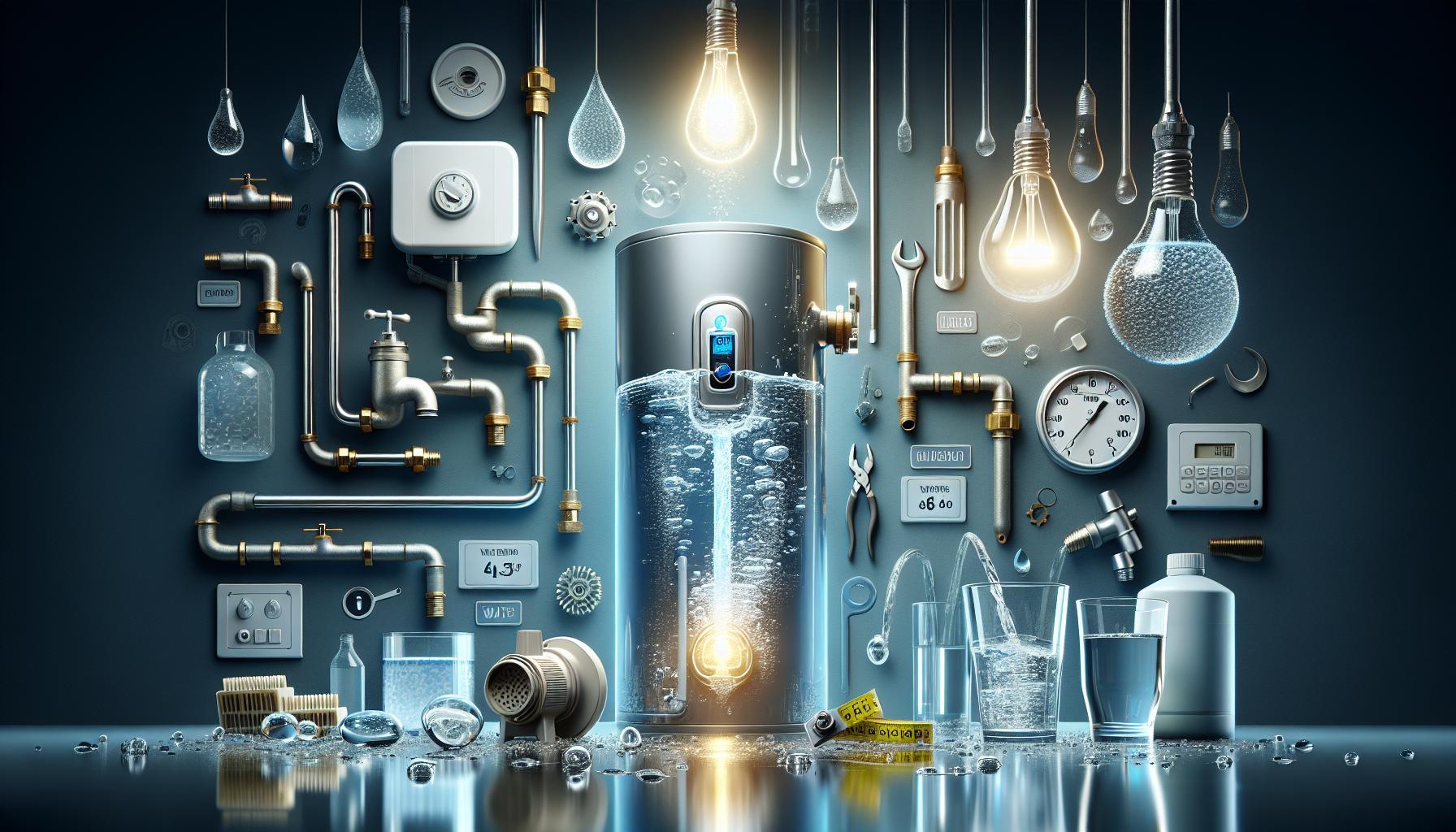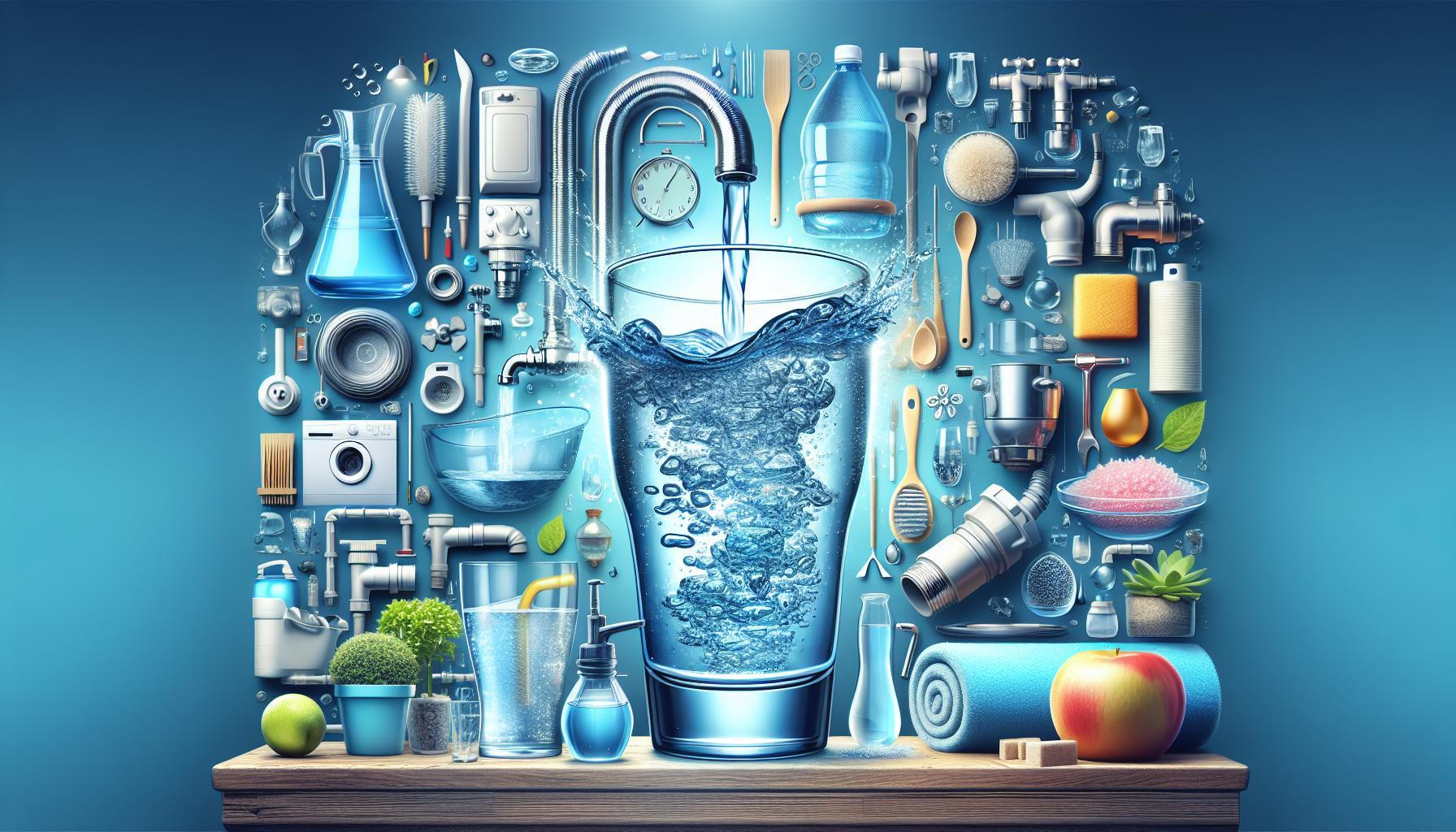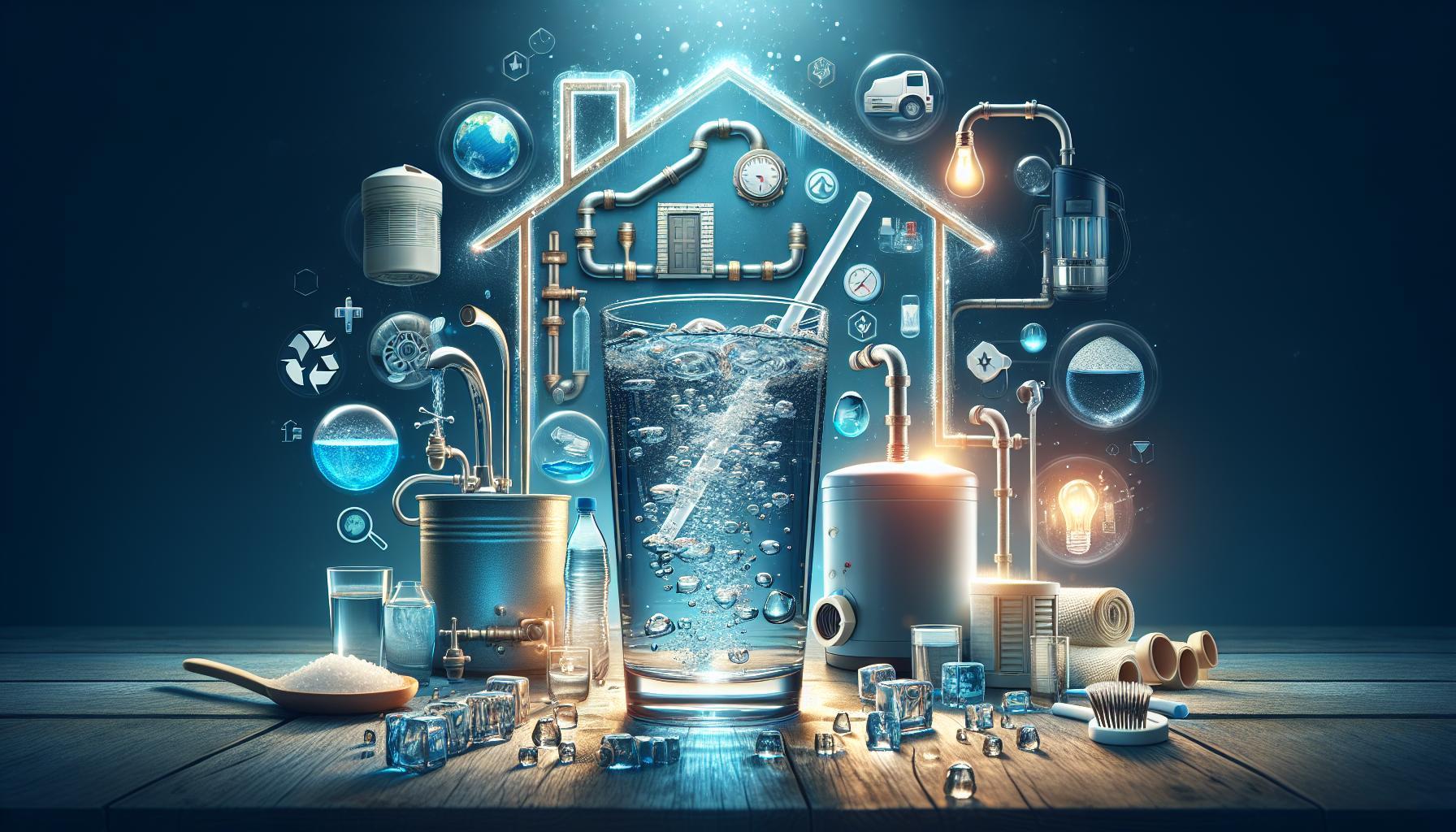If you’re wondering whether electric water heaters feature a pilot light, you’re not alone. Many people are confused about the differences between electric and gas models. Understanding these distinctions is crucial since they affect maintenance, efficiency, and functionality. The answer is clear: electric water heaters do not have a pilot light, relying instead on electricity to heat water effectively.
Understanding Electric Water Heaters: No Pilot Light Needed
Electric water heaters operate using a straightforward and efficient heating process that eliminates the need for a pilot light. Unlike their gas-powered counterparts, which rely on a continuous flame to ignite the burner, electric models utilize heating elements submerged in water. This design not only enhances safety but also simplifies installation and maintenance, making them a popular choice for homeowners.
How Electric Water Heaters Work
Electric water heaters contain two primary heating elements: an upper element and a lower element. When hot water is drawn from the tank, the thermostat triggers the upper heating element to activate, heating the water until it reaches the desired temperature. Depending on the demand for hot water, the lower element may also engage to ensure a consistent supply. The absence of a pilot light mitigates any concerns related to gas leaks or flame maintenance, which can be critical in households.
Advantages of No Pilot Light
The lack of a pilot light in electric water heaters presents several advantages:
- Enhanced Safety: Without an open flame, the risk of fire hazards significantly decreases.
- Energy Efficiency: Electric models are often more energy-efficient because they only use power when needed, unlike gas heaters that maintain a constant flame.
- Lower Maintenance: Electric water heaters require less maintenance, as there are no flame-related components to check, making them a more user-friendly option.
In summary, understanding the mechanism and benefits of electric water heaters highlights why they don’t utilize pilot lights. For those exploring their options, knowing that electric models provide reliable and safe heating without the complexities associated with gas systems can assist in making informed decisions about home water heating solutions.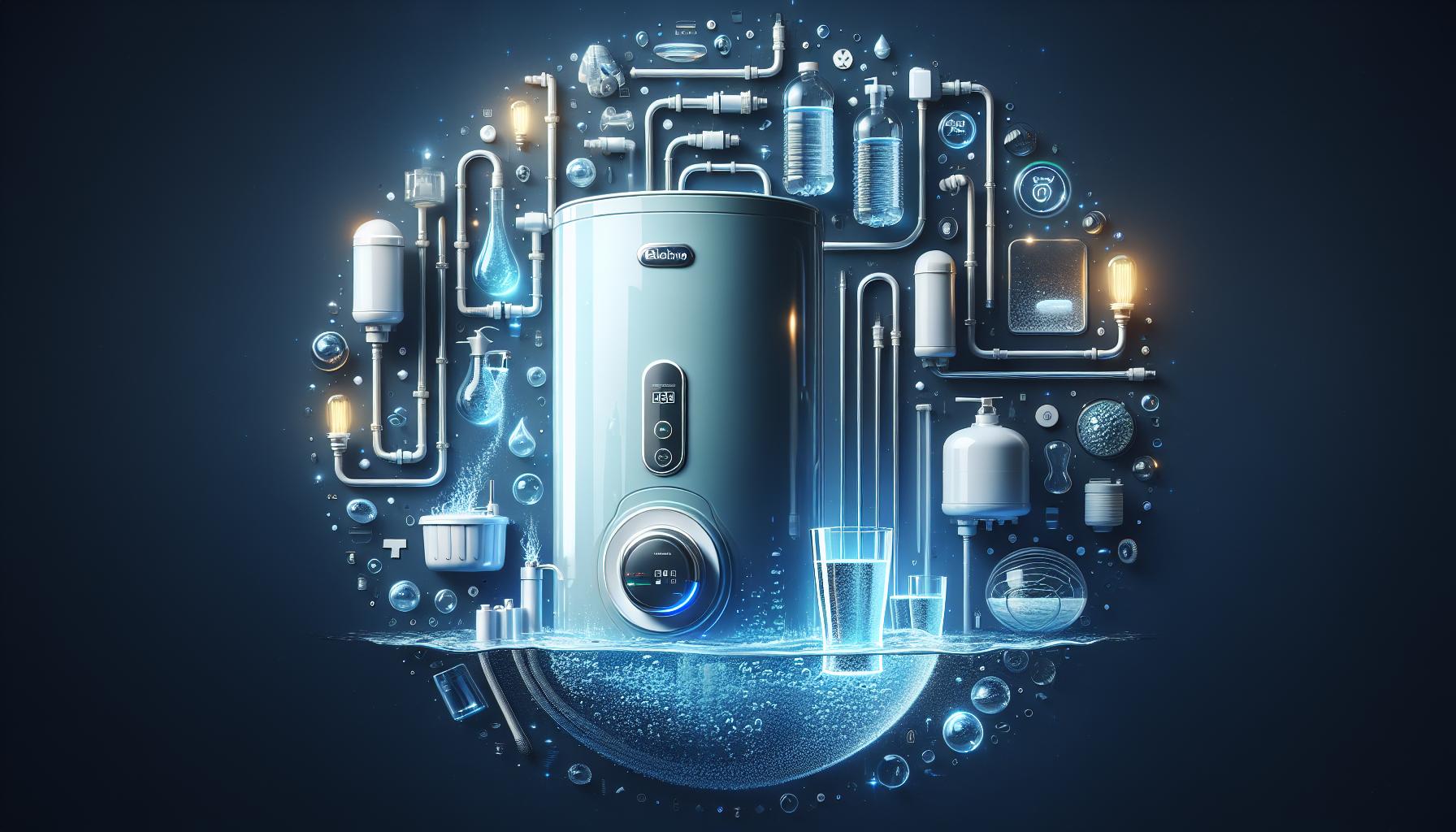
How Electric Water Heaters Operate Without a Flame
Electric water heaters are a marvel of modern technology, providing hot water on demand without the need for open flames or complex combustion systems. Instead of relying on gas flames or burners, these systems utilize electric heating elements to elevate water temperature efficiently and safely. This eliminates various hazards associated with flame-based heating, such as combustion byproducts and gas leaks, making electric models a popular choice among homeowners.
At their core, electric water heaters consist of two primary heating elements—one located near the top and the other at the bottom of the tank. When you turn on the hot water tap, the thermostat detects the temperature drop and activates the heating elements. These elements, submerged in the water, generate heat directly, causing the water to rise in temperature quickly. This method of heating is not only efficient but allows for precise temperature control without the need for a pilot light, which is often a concern with gas water heaters.
Energy Efficiency and Safety Features
Electric water heaters also incorporate various safety features that enhance their operational reliability. For instance, most models are equipped with a pressure relief valve. This valve is designed to automatically release water if the temperature or pressure inside the tank exceeds safe limits, preventing potential hazards associated with excessive pressure build-up.
Moreover, since there’s no combustion process, electric water heaters typically exhibit higher energy efficiency when compared to traditional gas models, as they do not lose heat through venting processes. Additionally, the absence of a pilot light means there’s less energy wasted when the unit is not in use, contributing to lower utility bills over time.
Ultimately, understanding is crucial for homeowners looking to maintain their systems effectively. Regular checks of the heating elements and the thermostat, along with adherence to safety protocols, will ensure these appliances function efficiently and safely throughout their lifetime.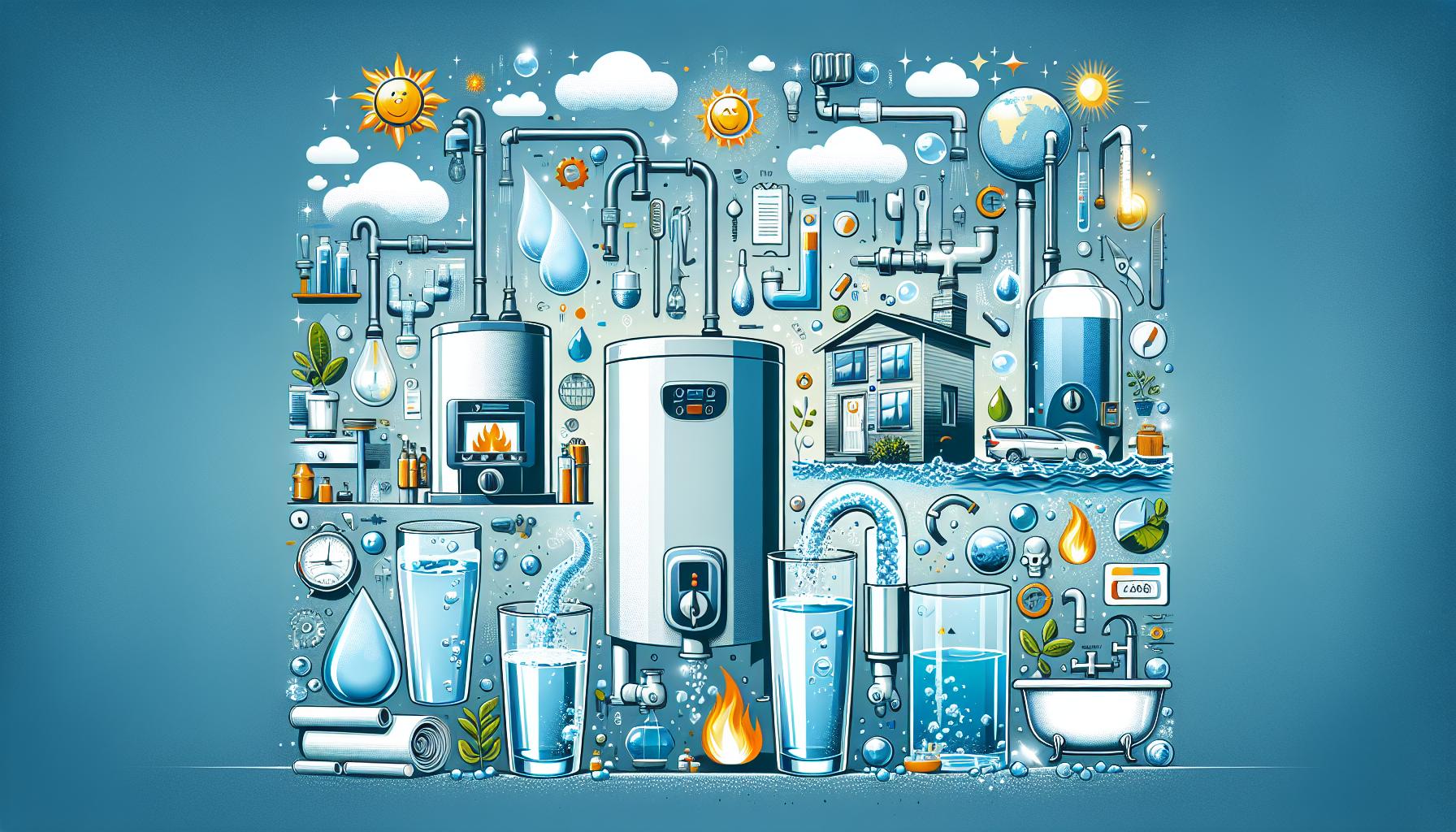
Safety Features of Electric Water Heaters Compared to Gas Models
Electric water heaters and gas models each come with their own set of safety features designed to mitigate risks associated with their operation. Electric water heaters are generally considered to provide a safer alternative to gas models due to their design and the absence of flammable gases. While gas heaters require a pilot light—a small flame that ignites gas to heat water—electric models operate without any open flames, significantly reducing the risk of fires and explosions caused by gas leaks.
Key Safety Features of Electric Water Heaters
One of the prominent safety features in electric water heaters is the built-in temperature and pressure relief valve. This important mechanism is designed to prevent the tank from exploding if internal pressure builds up excessively. When the water heater overheats, the valve releases steam and water, maintaining safe operating conditions. Additionally, electric models often include:
- Thermal Cut-Off Switch: This safety feature automatically shuts off power to the heater if the water temperature exceeds a preset limit, preventing overheating.
- Ground Fault Circuit Interrupter (GFCI): Many electric water heaters use GFCI outlets that help prevent electrical shocks by disconnecting power when discrepancies are detected between incoming and outgoing currents.
- Anode Rod: This component helps prevent corrosion within the tank, prolonging the unit’s life and preventing leaks that could cause water damage.
In contrast, gas water heaters rely heavily on their pilots and combustion processes, which can introduce hazards like fire and gas leaks. These models require proper ventilation to ensure that harmful gases like carbon monoxide are safely vented outside, making installation and maintenance more critical. Gas leaks can often go undetected until they result in serious issues, whereas electric heaters can be safer, provided they are correctly maintained and serviced by licensed professionals.
Understanding the Differences
To highlight the safety differences between electric and gas water heaters, the following table summarizes key features:
| Feature | Electric Water Heaters | Gas Water Heaters |
|---|---|---|
| Flame Source | No open flames | Requires pilot light |
| Temperature and Pressure Safety | Relief valve, thermal cut-off | Requires manual monitoring |
| Electrical safety | GFCI protected | Venting required |
| Corrosion Prevention | Anode rod | No dedicated feature |
In conclusion, electric water heaters present a range of safety advantages over their gas counterparts. By eliminating the risks associated with flammable gases and incorporating multiple fail-safes, they ensure a reliable and secure supply of hot water for households. When considering the question, “Does an Electric Water Heater Have a Pilot Light? What You Need to Know,” it becomes apparent that electric units not only lack this feature but are also designed with safety precautions that make them a compelling choice for many homeowners.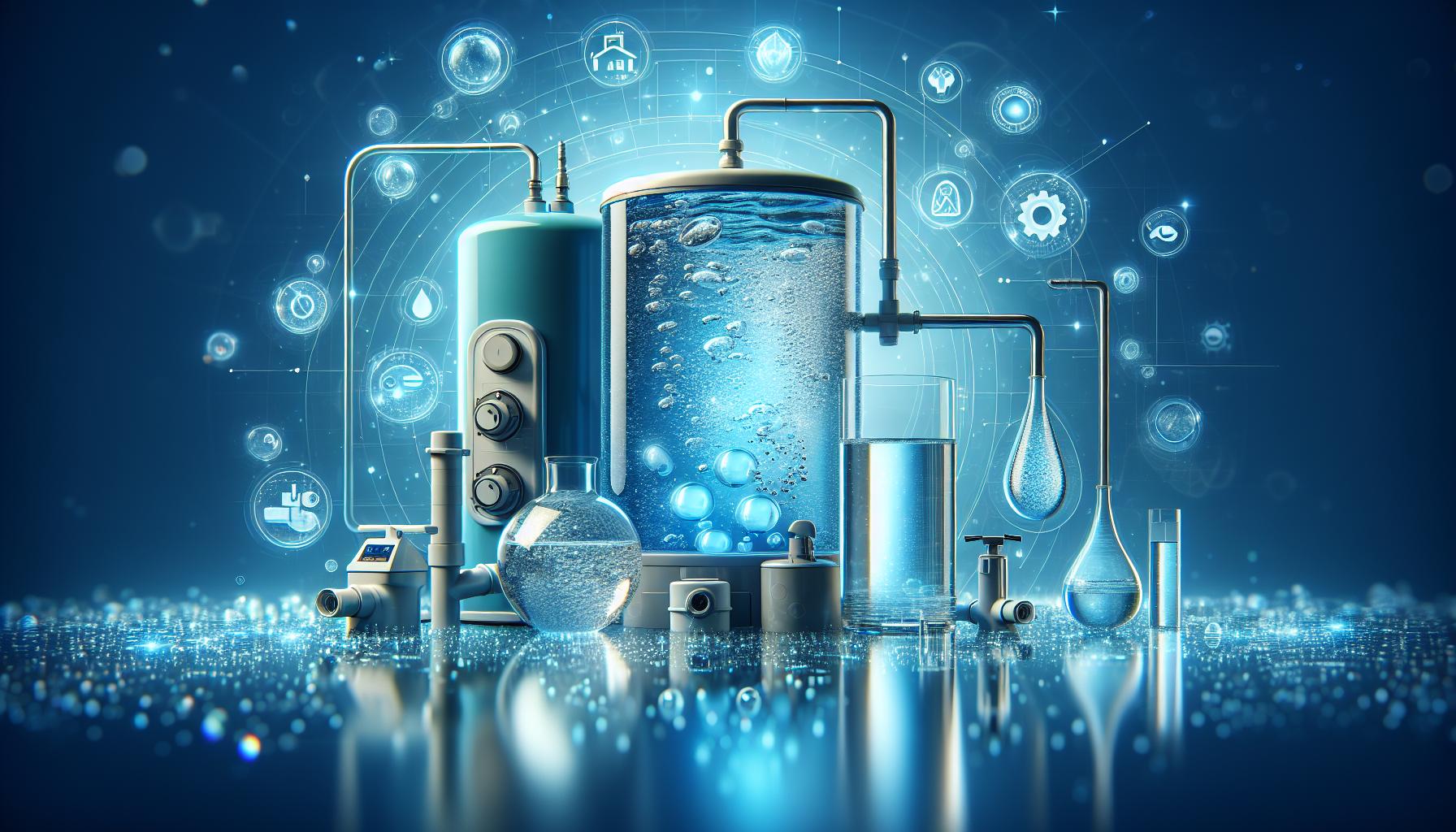
Common Misconceptions About Electric Water Heaters and Pilot Lights
Electric water heaters are often surrounded by myths, especially regarding their operation and components. One of the most prevalent misconceptions is that electric water heaters require a pilot light, similar to gas models. In reality, electric water heaters operate without a pilot light. Instead, they utilize electric heating elements that directly heat the water inside the tank. This fundamental difference in technology can lead to confusion among homeowners new to electric systems.
Understanding that electric water heaters do not feature pilot lights can clarify several operational aspects. For instance, electric units are generally easier to manage because they lack the complexities of gas models. This means there are fewer components to maintain, reducing the risk of malfunctions associated with pilot light ignition and sustainability. Furthermore, electric models can operate in various locations where gas plumbing may not be available, providing flexibility for homeowners.
Despite the absence of a pilot light, some misconceptions persist regarding energy efficiency and safety. Many believe that electric heaters consume significantly more power due to the lack of a standing pilot flame, yet this is often not the case. Electric water heaters can be highly efficient, especially when utilizing modern technologies such as timers and smart controls that optimize heating cycles based on usage patterns. These features can help manage energy consumption effectively and provide substantial savings on utility bills.
To illustrate the differences between electric and gas water heaters, it might be helpful to summarize some key points in a comparative format:
| Feature | Electric Water Heater | Gas Water Heater |
|---|---|---|
| Pilot Light | No | Yes |
| Heating Method | Electric resistance coils | Gas combustion flame |
| Efficiency | High with advanced controls | Varies, less efficient if pilot light is always on |
| Installation Flexibility | Higher – can be placed anywhere with electricity | Lower – requires gas lines |
By debunking these myths, homeowners can make more informed decisions regarding their water heating systems. Understanding how electric water heaters operate can lead to better maintenance practices and energy usage, ultimately enhancing home comfort without unnecessary expenditure.
Troubleshooting Electric Water Heater Issues: What to Check First
If you’re experiencing issues with your electric water heater, it’s essential to understand where to begin troubleshooting. Unlike gas water heaters, electric models do not have a pilot light, which can sometimes lead to confusion about their operation. Instead, they rely on heating elements that may fail, electrical supply issues, or other mechanical failures. Start your troubleshooting by checking a few key components to identify the problem more effectively.
Power Supply Check
Ensure that your water heater is receiving power. Begin by checking the circuit breaker for any tripped switches. If the breaker is off, reset it and monitor your heater. If the breaker trips again, it may indicate a more serious electrical issue, such as a short circuit or faulty element that needs immediate attention.
Heating Elements
Electric water heaters generally come equipped with one or two heating elements. These elements can burn out over time, leading to insufficient hot water. To check if the heating elements are functioning, you can use a multimeter to measure their resistance. If you find an open circuit, the heating element may need replacing.
- Upper Element: This is typically responsible for heating water first and should be tested for continuity.
- Lower Element: Often neglected but equally important, this element heats water that has been drawn from the tank. Ensuring it’s operational is crucial for maintaining consistent hot water supply.
Temperature Settings
Sometimes, the issue may simply be incorrect temperature settings. Check the thermostat settings on your water heater; these can typically be adjusted to suit your needs. Ideal temperatures are generally set between 120°F to 140°F for optimal performance. If the thermostat is malfunctioning, you might also consider replacing it.
Other Common Issues
While checking the above components, be alert for other common issues that could arise with electric water heaters. For example:
- Check for leaks around the temperature pressure relief valve, as these can indicate excessive pressure build-up.
- Inspect for any signs of sediment build-up in the tank that can affect heating efficiency.
By systematically reviewing these aspects, you can effectively diagnose many common water heater problems that may arise in your home. Addressing these issues promptly can help maintain the longevity of your electric water heater while ensuring you have access to hot water when you need it most.
Energy Efficiency of Electric Water Heaters: Is it Worth It?
Electric water heaters are gaining popularity not just for their convenience, but also for their energy efficiency. As homeowners seek sustainable solutions, understanding the efficiency of these systems can help make informed decisions. One significant advantage of electric water heaters is their ability to maintain heat longer than gas counterparts due to well-insulated designs. This means less energy is wasted, providing a substantial long-term benefit that offsets initial purchase and installation costs.
Understanding Energy Savings
When considering if switching to an electric water heater is worthwhile, the potential savings in energy bills can be a major factor. For example, an ENERGY STAR certified electric water heater can save a family of four approximately $600 annually on electric bills due to advanced technology that enhances efficiency [[3](https://www.energystar.gov/products/energy_star_home_upgrade/super_efficient_water_heater)]. The savings stem from reduced energy consumption, as these units often integrate features that maximize heat retention and minimize loss.
Innovative Technology Drives Efficiency
Recent advancements in electric water heater technology, such as heat pump water heaters, have revolutionized the market. These units draw energy from the ambient air, making them several times more efficient than traditional models. By repurposing what would otherwise be wasted energy, they not only reduce utility costs but also lessen environmental impact. This shift towards more efficient technology reflects a broader trend in the industry, making electric models increasingly appealing.
| Type of Water Heater | Annual Energy Cost Savings | Efficiency Rating |
|---|---|---|
| Standard Electric Water Heater | $0 | 0.9 EF |
| ENERGY STAR Certified Heat Pump Water Heater | $600+ | 2.0 EF |
| Traditional Gas Water Heater | Varies | 0.6-0.7 EF |
The upfront costs of electric water heaters can sometimes deter consumers, but it is essential to consider the long-term financial benefits. By investing in a model that harnesses the latest technology, users can enjoy substantial savings over time, all while reducing their carbon footprint. Transitioning to an electric water heater not only answers practical concerns about heating water but also aligns with a growing commitment to energy efficiency, making it a wise choice for many households.
Maintenance Tips to Keep Your Electric Water Heater Running Smoothly
Electric water heaters are a staple in many homes due to their efficiency and convenience. Unlike gas water heaters, which rely on a pilot light for ignition, electric models utilize heating elements that need regular attention to ensure optimal performance. By incorporating essential maintenance practices, you can prolong the life of your electric water heater and avoid unexpected breakdowns, which can save you time and money in the long run.
Regular Flushing
One key aspect of maintenance is to flush the tank regularly. Over time, sediment can build up in the bottom of the tank, especially in areas with hard water. This sediment can affect heating efficiency and lead to corrosion. Aim to flush your electric water heater at least twice a year, or more frequently if you notice a significant amount of sediment in the water. To do this, follow these simple steps:
- Turn off the power to the water heater from the service panel.
- Connect a garden hose to the drain valve at the bottom of the tank.
- Open the drain valve and allow the water to flow out until it runs clear.
- Close the valve, remove the hose, and refill the tank before restoring power.
Check the Temperature Setting
Another vital maintenance tip involves checking the thermostat settings. Ideally, the water temperature should be set to 120°F (49°C). This not only ensures optimal performance but also helps to save energy costs. Too high a setting can lead to scalding and energy wastage, while too low a setting may result in insufficient hot water supply. Use a screwdriver to access the thermostat and make necessary adjustments.
Inspect for Leaks and Damage
Regular inspections for leaks and damage to your electric water heater are crucial for maintaining its functionality. Periodically check the connections, valves, and other components for signs of wear or corrosion. If you detect any leaks, it’s important to turn off the power and water supply immediately to prevent further damage. In cases where you encounter significant issues, contact a professional for assistance.
Test the Pressure Relief Valve
Lastly, testing the temperature and pressure relief (TPR) valve should be part of your routine maintenance. This valve is essential for releasing excess pressure that could lead to a dangerous explosion if the tank overheats. To test it, lift the lever on the valve and let a small amount of water escape. If water flows freely and the valve reseals properly, it is functioning effectively. Make it a habit to perform this test annually to ensure safety and reliability.
By following these simple yet effective maintenance tips, you can keep your electric water heater running smoothly, ensuring that it provides ample hot water whenever you need it. By preventing issues before they arise, you’ll save money on repairs and extend the life of your appliance, allowing you to enjoy the benefits of hot water without the worry of frequent malfunctions.
When to Call a Professional for Your Electric Water Heater Concerns
Understanding the nuances of electric water heaters can significantly enhance the long-term functionality and safety of your home. Unlike traditional gas systems, electric heaters don’t have a pilot light, which can lead to some confusion regarding maintenance and troubleshooting. However, knowing when to call a professional can save you time, money, and potential hazards. If you notice any unusual behavior from your electric water heater, it’s essential to act promptly.
Signs That Indicate It’s Time to Call a Professional
There are several indicators that may suggest your electric water heater is in distress and requires expert attention. Here are a few crucial signs to watch for:
- Inconsistent Water Temperature: If your water heater is providing water that is either too hot or too cold, this discrepancy could indicate a problem with the thermostat or heating elements.
- Leakage: Any visible leaks around the heater or water pooling at the base can signal a serious issue, possibly related to the tank’s integrity or connections.
- Strange Noises: Banging, popping, or other unusual sounds coming from the unit are often alerts that sediment buildup is affecting its operation.
- Electrical Issues: Frequent tripping of circuit breakers or burning smells nearby can point to electrical problems that pose safety risks.
Be attentive to these signs. Ignoring them might lead to more significant damage, which can be costly to repair.
When Professional Intervention Is Non-Negotiable
While minor troubleshooting can often be handled by savvy homeowners, certain issues mandate that you contact a qualified technician. Situations where professional intervention is essential include:
- Tank Corrosion: If rust or corrosion is visible, this could indicate that the tank is nearing the end of its life, necessitating replacement rather than repair.
- Regular Maintenance: Electric water heaters benefit from routine inspections. If you’re unsure how to conduct these safely, professional help is advised.
- Unresponsive Units: If the electric water heater fails to heat water or shows no signs of operation, it’s best to let a professional assess the underlying cause.
Making timely decisions can greatly improve your electric water heater’s longevity and efficiency, while also ensuring the safety and comfort of your home. If you experience any of these symptoms or have concerns about your unit, don’t hesitate to reach out to a professional service for assistance.
FAQ
Does an Electric Water Heater Have a Pilot Light? What You Need to Know?
Electric water heaters do not have a pilot light. Instead, they operate using electric heating elements that heat the water directly, making pilot lights unnecessary. This differs significantly from gas water heaters, which rely on a pilot light to ignite the gas.
In electric models, heating is controlled through thermostats which activate the elements as needed, maintaining water temperature effectively. This eliminates the potential problems associated with pilot lights, such as failure or the need for frequent relighting. If you’re curious about how water heaters function, check out our detailed guide on electric water heaters.
How does an electric water heater work?
An electric water heater heats water using electric heating elements. When the thermostat detects that the water’s temperature has dropped below a set level, it activates the heating elements, warming the water.
These heaters fill a tank with water and maintain it at a designated temperature, ensuring hot water is available on demand. Unlike gas models, they have no need for combustion, resulting in fewer safety concerns related to gas leaks or pilot light issues.
Can I replace my gas water heater with an electric one?
Yes, you can replace a gas water heater with an electric one. However, it’s essential to consider factors like electric wiring and possibly increased utility costs.
Switching to an electric water heater may lead to higher electric bills, while reducing your gas bill. Evaluating the efficiency of the electric model and your household’s hot water needs will guide this decision effectively.
Why does my electric water heater make noise?
Noisy electric water heaters can indicate mineral buildup or sediment. Over time, minerals can accumulate at the tank’s bottom, causing popping or rumbling sounds when elements heat the water.
Regular maintenance, including flushing the tank, can help prevent these noises and improve efficiency. If you’re unsure about the maintenance process, consult a professional or refer to maintenance guidelines for electric water heaters.
What size electric water heater do I need?
The size of your electric water heater should depend on your household’s hot water needs. Common sizes range from 30 to 80 gallons, with larger families generally requiring larger tanks.
Consider factors such as the number of people in your home and peak usage times when choosing a size. A properly sized heater will provide adequate hot water without unnecessary energy expenditure.
Do electric water heaters consume a lot of energy?
Electric water heaters can consume a significant amount of energy, depending on usage. They typically use more energy than gas heaters, especially in colder climates where heat loss is a factor.
To manage energy use, consider installing a more energy-efficient model or a smart thermostat. Making energy-conscious choices can help mitigate higher electricity costs while still providing adequate hot water.
Can I install an electric water heater myself?
While it’s possible to install an electric water heater yourself, professional installation is recommended. This ensures safety and adherence to local codes.
Improper installation can lead to efficiency issues or safety hazards. If you choose to do it yourself, make sure to follow the manufacturer’s instructions and consider hiring a qualified electrician for the electrical connections.
In Summary
In summary, electric water heaters do not use a pilot light, as they operate differently from gas models. Instead, they rely on electric heating elements to warm the water, making them simpler in terms of ignition systems. Understanding this distinction is vital for effective troubleshooting and maintenance. By familiarizing yourself with the operation of your electric water heater, you can confidently address common issues and ensure reliable hot water supply in your home. For more tips on water heater maintenance and troubleshooting, we encourage you to explore our additional resources. Empower yourself with knowledge and tackle your water-related challenges with ease!

